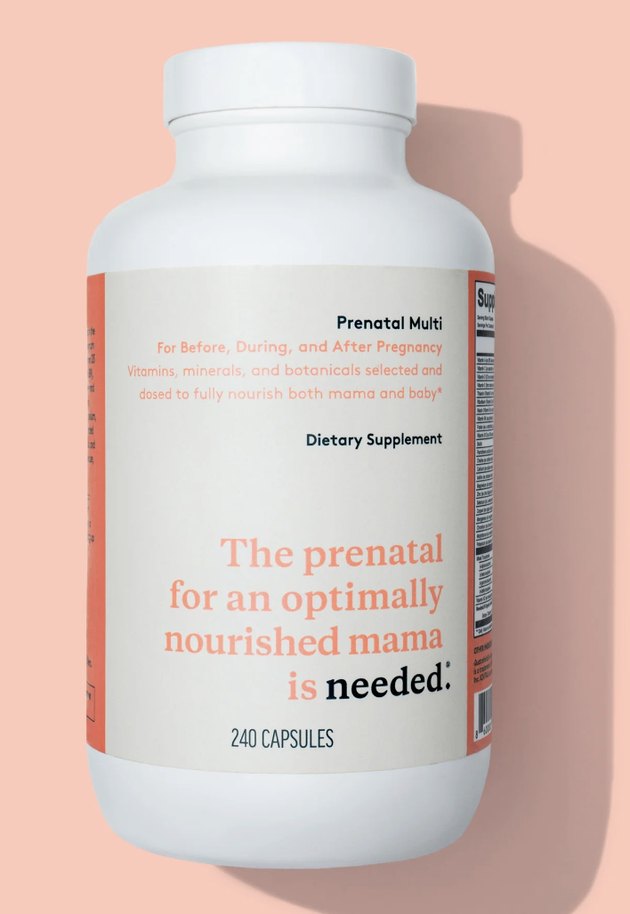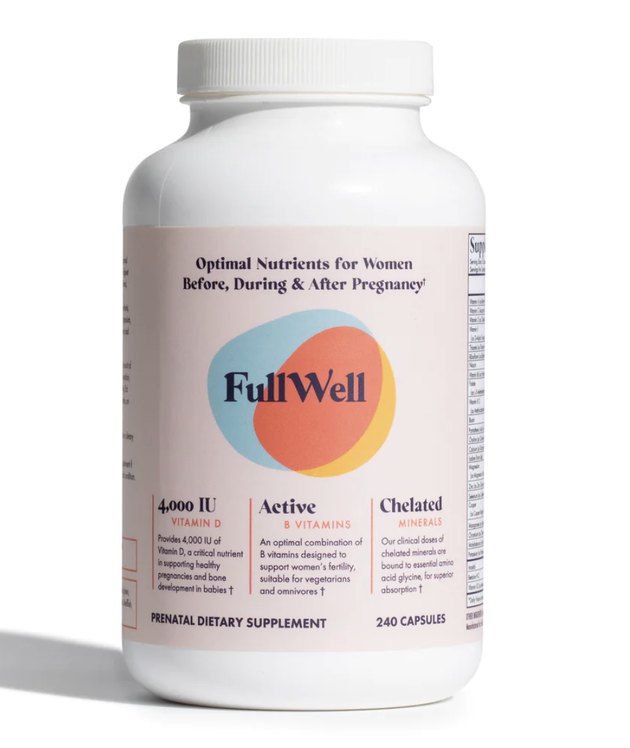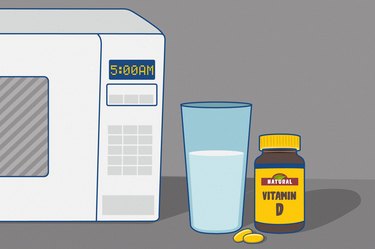
Designed to deliver vital nutrients during pregnancy, prenatal supplements are some of the most comprehensive multivitamins on the market.
This is why many people who aren't pregnant — like those trying to conceive or looking to improve their hair, skin and nails — gravitate toward prenatals, too.
Video of the Day
Video of the Day
That's totally fine if you're planning to get pregnant. In fact, you should start taking a prenatal at least three months prior to pregnancy, says Stephanie Hack, MD, MPH, a board-certified ob-gyn and host of the Lady Parts Doctor podcast.
This ensures your levels of folic acid — which is fundamentally important for a developing fetus — are sufficient once you conceive. During pregnancy, you need more of this B vitamin, which helps prevent certain birth defects, Dr. Hack says.
"Getting some lab work done during this time period can be helpful, too, as you'll be made aware of any potential [nutrient] deficiencies that exist and have time to mitigate them prior to conception," says Kristin Brown, RD, a prenatal dietitian.
Before pregnancy, Brown recommends being tested specifically for vitamin D, iron and vitamin B12.
"Then you can choose your prenatal based on the gaps that exist in your diet and what your blood work is showing," she says.
But what if you're not planning a pregnancy? You might think, "All those extra vitamins and minerals packed into one pill must be really good for you, right?" Well, not always.
Like many things in life, more isn't always better. The sentiment holds true for certain nutrients, especially when your body doesn't need them.
Here, we asked prenatal experts to weigh in on the possible side effects of taking prenatal vitamins when you're not pregnant (or trying) and to offer some potential alternatives.
1. It Could Mess With Your Vitamin B12 Levels
Vitamin B12 is crucial for healthy red blood cells, DNA synthesis and proper functioning of your central nervous system, according to the Harvard T.H. Chan School of Public Health. Simply put, B12 is very important.
When you take a prenatal just because, you run the risk of becoming B12 deficient. This is because prenatal vitamins contain a lot of folic acid, which doesn't always "play" well with B12.
Pregnant people require more folic acid to help prevent certain birth defects, so many prenatals include about 800 micrograms of it. This amount is generally too much for non-pregnant folks, who need closer to 400 micrograms daily, per the Mayo Clinic.
This excess of folic acid can interfere with your existing vitamin B12 levels.
"Some studies have shown that taking too much folate can make some symptoms of vitamin B12 deficiency worse (like anemia or cognitive impairment), although the mechanism is not well understood," Dr. Hack says.
Brown agrees. "The issue with taking higher doses of folic acid consistently is that it can mask a vitamin B12 deficiency, which makes it harder to diagnose and treat," she adds.
That said, a "prenatal vitamin typically contains both folate and vitamin B12, so a vitamin B12 deficiency is less likely to occur," Brown says.
And luckily, most healthy individuals in their reproductive years usually get enough vitamin B12 through diet or other vitamin supplements.
Plus, vitamin B12 deficiency is "more prevalent in older adults, and less of a concern for folks of childbearing age," Brown says.
2. You Might Not Get Enough Zinc
Zinc is another nutrient that's necessary for good health. It plays a vital role in DNA formation, cell growth, protein creation, tissue healing and a strong immune system, according to Harvard T.H. Chan School of Public Health.
But when you take prenatals (especially if you're not pregnant), it can keep your body from absorbing enough zinc. This is because many prenatals are formulated with iron, "which competes with zinc for intestinal absorption," Dr. Hack says.
Basically, excess supplementation of one nutrient can affect the levels of the other (i.e., if your body gets an excess of iron, it will not absorb enough zinc.)
This is one of the reasons Brown recommends iron be taken separate from a prenatal vitamin.
Tip
You need iron to make more blood cells during pregnancy. For reference, pregnant people require 27 milligrams of iron a day versus 8 to 18 milligrams for non-pregnant people, per the Mayo Clinic.
3. It Could Cause GI Issues
Gastrointestinal discomfort is yet another possibility when taking a prenatal vitamin.
The most common complaint with prenatals is that they can cause constipation or, conversely, loose stools, per the Mayo Clinic.
Often these stomach-related side effects have to do with the higher dose of iron found in prenatal vitamins. (Iron supplements can also cause stomach cramps and nausea, per the National Library of Medicine.)
Exactly why iron instigates these symptoms isn't well understood, Dr. Hack says.
Alternatives to Prenatal Vitamins
If you're not pregnant, trying to conceive or lactating, you may not need to take a multivitamin or supplement at all. In fact, the best way to get the nutrients you need is through food, according to the American Academy of Family Physicians. Your body can more easily absorb micronutrients from food than from a supplement.
If you are planning a pregnancy, are postpartum or have dietary restrictions that prevent you from getting certain nutrients, here are some options to consider:
1. Iron-Free or Non-Constipating Prenatals
If you're trying to conceive, a conventional prenatal vitamin fortified with iron (which can cause GI upset) might not be a good fit for you.
Instead, you could try iron-free or non-constipating prenatal vitamins, which provide many of the nutrients needed during pregnancy, minus the stomach issues.
For example, "If you find that your prenatal vitamin is making you nauseous, try another one with iron bisglycinate, a form of iron that tends to be gentler on the digestive tract," Brown says.
You could also try an iron-free prenatal, as you might not even need the additional iron supplementation, Brown says. In fact, many adults get a sufficient amount of iron through their diet alone, per the National Institutes of Health. You may only need to supplement if your iron levels are low, Brown says.
Those who might be prone to iron deficiency include frequent blood donors, people with heavy periods, vegetarians and those living with an intestinal disorder such as celiac disease, according to the Mayo Clinic.
For these folks, it's a smart idea to discuss an iron supplement with a medical provider.
Brown recommends the following iron-free prenatals to help prevent upset stomach:
2. Postnatal Vitamins
While there's no harm in continuing to take a prenatal after you give birth, there are other multivitamins formulated especially for the postpartum period and people who choose to chestfeed.
Known as postnatal vitamins, these supplements offer additional nutrient support for lactation, Dr. Hack says.
This matters because you need more nutrients while chestfeeding. In fact, "your metabolism increases by 15 to 25 percent while breastfeeding/chestfeeding due to milk production," she says.
Brown agrees that when you're producing milk, your body needs a higher amount of certain nutrients than it does during pregnancy. These needs will vary even further depending on your birth experience (for instance, whether you had a vaginal birth or C-section).
A perfect example is the amount of choline you need per day — an essential nutrient for a healthy brain, nervous system and cell membranes. "During pregnancy, our choline needs are approximately 450 milligrams per day, but during lactation our needs go up to 550 milligrams per day," Brown says.
So, if you were taking a prenatal vitamin with little to no choline, switching to a postnatal would be ideal, Brown says.
However, "if you're taking a good quality prenatal that already includes higher amounts of these nutrients (like choline), then sticking with the same product is the best option," she adds.
3. Other Multivitamins and Supplements
You don't need to take a prenatal to promote skin, nail and hair health. In fact, if you're not planning to conceive, it's probably a better bet to find a supplement specifically suited for these health goals, Dr. Hack says.
For instance, if you want healthier hair, you might consider a hair-growth supplement like Nutrafol, which contains vitamins A and C as well as biotin and saw palmetto.
You could also just go with a good-quality multivitamin. Brown recommends Needed Women's Multi. "It's iron-free but contains therapeutic doses of many nutrients that are lacking in the standard American diet," she says.
Whichever multivitamin you choose, make sure to do your research on the product. Dr. Hack says that quality will vary greatly, as supplements aren't regulated by the Food and Drug Administration like medications are.
To ensure you're purchasing a quality supplement, know the ingredients, read the labels and take a look at customer reviews, Dr. Hack recommends.
And always discuss your plans to take a new supplement with your doctor, she says.
So, How Bad Is It Really to Take Prenatal Vitamins When You're Not Pregnant?
If you aren't pregnant or planning to become pregnant, there's really no need to take a prenatal vitamin, per the Mayo Clinic.
While doing so isn't necessarily dangerous, over time, it may potentially lead to certain health issues like vitamin and mineral deficiencies or GI problems.
It's important to remember that prenatals are specifically designed to fulfill dietary requirements during pregnancy, meaning they provide extra vitamins and minerals that are not necessary for non-pregnant people.
So instead of taking a prenatal, it's probably smarter to make healthy changes to your diet or invest in a vetted, high-quality multivitamin or supplement geared toward your specific health goals.
- Mayo Clinic: “Is it OK to take prenatal vitamins if I'm not pregnant, and I don't plan to become pregnant?”
- Harvard T.H. Chan School of Public Health: “Vitamin B12”
- Harvard T.H. Chan School of Public Health: “Zinc”
- Mayo Clinic: “Iron deficiency anemia”
- National Library of Medicine: "Taking iron supplements"
- National Institutes of Health: "Iron"
Was this article helpful?
150 Characters Max
0/150
Thank you for sharing!
Thank you for your feedback!





